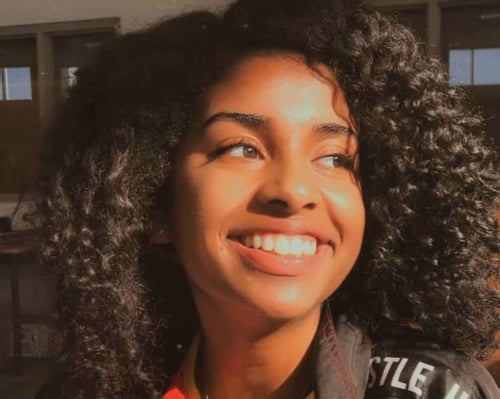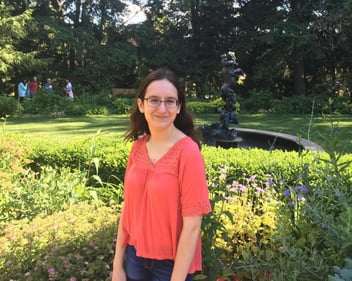It’s easy to see why Guest Judge Anne-Marie Te Whiu called Hannah Flores’s piece the “undeniable” winner of our Spoken Word Competition. In “If the World Was a Movie,” Hannah combined her many skills and talents—videography, editing, performance, writing, and more—into one gorgeous, moving piece documenting life during the COVID-19 pandemic.
Below, discover how quarantine has fueled Hannah’s creativity, what her journey as a spoken word poet has been like, and her advice for other aspiring spoken word poets.

Our guest judge Annie Te Whiu said this about your entry: “It is like a portal to this COVID time, and will hold true in years to come.” What was your process for crafting such a timely piece on what will no doubt be considered a historic period?
Since I was very young, I have always been curious about the world and fascinated by movies, so I stumbled upon this question that I asked myself: What if the world was a movie? Then, I asked myself: What if I made a movie about the world? These questions framed my entire poem. I started writing, looking at stories about experiences in quarantine from different parts of the globe for inspiration. I am interested in neuroscience, how people think and how society functions, so this was the perfect project to incorporate that mental shift in everyone’s lives with common stresses and “the new normal.” Once I had the idea to make this movie about the world, I felt hopeless, because how can one make a movie about the world without going out into the world? Fortunately, quarantine has shown me that my creativity does not rely on outside circumstances. I control it. With this in mind, I went digging through my files and gathered all of the old videos that I saved from my travels. I knew that people, like me, who are hungry for the outside world would greatly appreciate some imagery of different locations, in a way to travel virtually. Not only does the film itself go along with my words, my lines also cut out digital windows into the walls that currently confine us. Classical music is always moving, and this is emphasized in the song, Waves, that I chose to compliment the pacing of my poem.
You not only wrote and voiced your piece, but you also filmed, produced, and directed the accompanying video. Did you become a spoken word poet as a way to combine these many talents, or did you develop your technical skills to support your poetry?
Before my journey with spoken word poetry began, I was (and still am) a visual artist. Since I could hold a pencil, I have always loved drawing, painting, and taking photos. That was the thing that I was known for, as I trained my eyes to have an artistic lens and my own unique view of the world. I was introduced to spoken word later on in elementary school, and I instantly fell in love with it. I have kept these two passions of mine separate for the longest time, until a few months ago when I realized that film was the perfect medium to unite them. My technical skills in visual arts have progressed over the years, allowing me to use them as a great support system for my poetry and voice. As I have said before: “Cinema is the most beautiful fraud in the entire world.”
What advice would you give to other young people interested in spoken word poetry?
Focus on yourself, and put your passions and interests first. Try not to get too caught up in writing about something that you think your audience will want to hear. At the end of the day, poems that come from a place of your own knowledge, experience, and passion will write themselves. This will transcend through your voice, your body language, performance and poem, and your audience will love it! Be authentically yourself first. For me, writing my poems with the performance in mind as I write is very helpful. This creates fluidity and movement in the piece and helps it to feel natural. Put a piece of yourself in your work. And do not forget, as writers and people in this world, your words and stories are valid. We need your voice out here, and the world always needs more young people to speak their truth, speak their art and speak up.
Which spoken word poets have influenced your work?
This is a difficult question, because I cannot say that any specific poets have directly influenced my work. I was first introduced to slam poetry when I was 11 years old and, back then, I was still trying to find my “trademark” style. I was in the elementary division of my school board’s spoken word competition, and I was in awe of the maturity, boldness and character that the high school students brought to their performances and poems. Over the past 6 years, I have seen countless YouTube videos of different poets. I quickly realized that I did not want to be “like them,” but I wanted to become as presentable, bold, and confident as them in my performance and voice.
My eighth grade teacher really helped me embrace my own voice and the power that it has, while coaching me on stage presence and how to project my voice. My current teacher advisor for spoken word has opened so many doors for me in terms of reaching out to larger public audiences and she always encourages me to continue improving, to keep writing, and to have a lot fun throughout the process. The funny thing is, I was once very shy when I was much younger and hated speaking up for myself. Thankfully, my mother, who has been my biggest supporter since day one, and my teachers have built the strong support system that I needed. My work has been influenced by my own personal experiences, travels, emotions and questions that I pose to myself about the world around me. My work is the voice of my 17 years spent living and breathing on this planet. My poems are products of the person who I have become and who I am still becoming.





